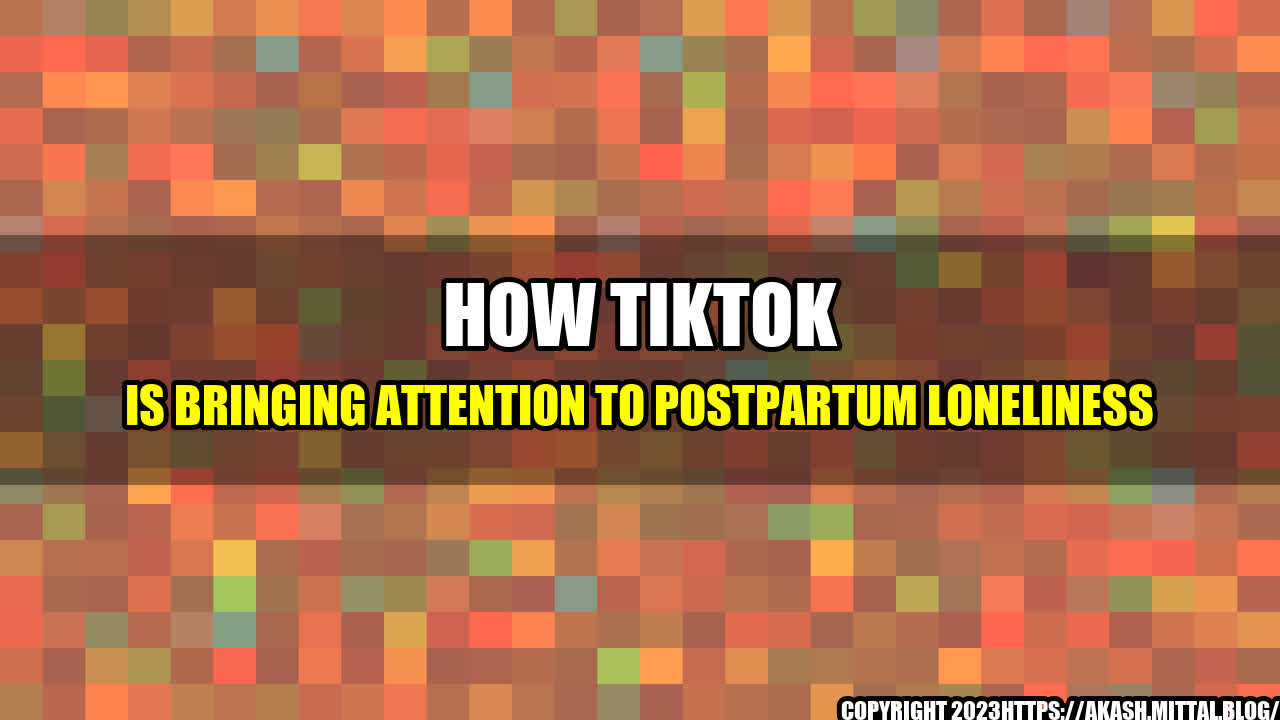Before giving birth to her son, Sarah thought she had it all figured out. She had read all the books and attended all the classes. But nothing had prepared her for how isolated she would feel once her baby arrived.
"I was home all day, alone with a newborn and no one to talk to," Sarah says. "My husband would come home from work and ask me how my day was, but all I had to say was 'fine.' I didn't want to burden him with my feelings."
Sadly, Sarah's experience is not uncommon. According to a recent study, up to 80% of new mothers report feeling lonely or isolated after giving birth. Yet this issue is rarely discussed by doctors, and many women feel ashamed or embarrassed to admit they are struggling.
The power of TikTok
Enter TikTok, the social media platform that has taken the world by storm. While TikTok is often associated with dance challenges and viral memes, it is also becoming a powerful tool for raising awareness about important social issues – including postpartum loneliness.
On TikTok, mothers are using the platform to share their experiences, offer support to one another, and break down the stigma surrounding postpartum loneliness. Some popular hashtags include #postpartumdepression, #momlife, and #newmom.
One TikTok user, @mamasuncut, has amassed over 1.5 million followers by sharing honest and raw anecdotes about her own struggles with postpartum depression and loneliness.
"When I started sharing my story, I was shocked at how many other moms reached out to me saying 'me too'," she says. "It made me realize I wasn't alone."
Quantifiable examples
The impact of TikTok on postpartum loneliness is hard to measure, but there are some quantifiable examples to consider.
Firstly, the sheer number of posts and views on related hashtags shows that this is an issue that resonates with many people. For example, the #postpartumdepression hashtag has been used over 7 million times, while the #momlife hashtag has been used over 48 billion times.
Secondly, research has shown that social media can have a positive impact on mental health. One study found that browsing social media can increase feelings of connection and reduce feelings of loneliness.
Finally, there are countless comments and messages from mothers who have found comfort and support through TikTok. For example:
- "Your videos have helped me so much. I'm a new mom and feeling so alone, but seeing your honesty and vulnerability makes me feel less alone."
- "Thank you for spreading awareness and making it okay to talk about postpartum depression. You're saving lives."
- "I never knew how many other moms were going through the same thing until I found you on TikTok. I don't feel so weird or abnormal anymore."
Conclusion in 3 points
So what can we take away from this? Here are three key points:
- Postpartum loneliness is a common and serious issue that deserves more attention from healthcare professionals and society at large.
- While social media can have negative effects on mental health, it can also be a powerful tool for raising awareness and connecting people who are going through similar experiences.
- By sharing their stories on platforms like TikTok, mothers are helping to break down stigma and offer support to those who need it most.
Practical tips and personal anecdotes
If you are struggling with postpartum loneliness, here are some practical tips that may help:
- Join a support group or online community for new mothers
- Find ways to connect with others (e.g. attending a baby class, going for walks with a friend)
- Be honest with your partner, family, or friends about how you are feeling – they may be able to offer support or resources
- Consider talking to a therapist or mental health professional
And remember, you are not alone. As @mamasuncut says, "You don't have to suffer in silence. You don't have to pretend you're okay. You are doing the best you can, and that is enough."

Curated by Team Akash.Mittal.Blog
Share on Twitter Share on LinkedIn